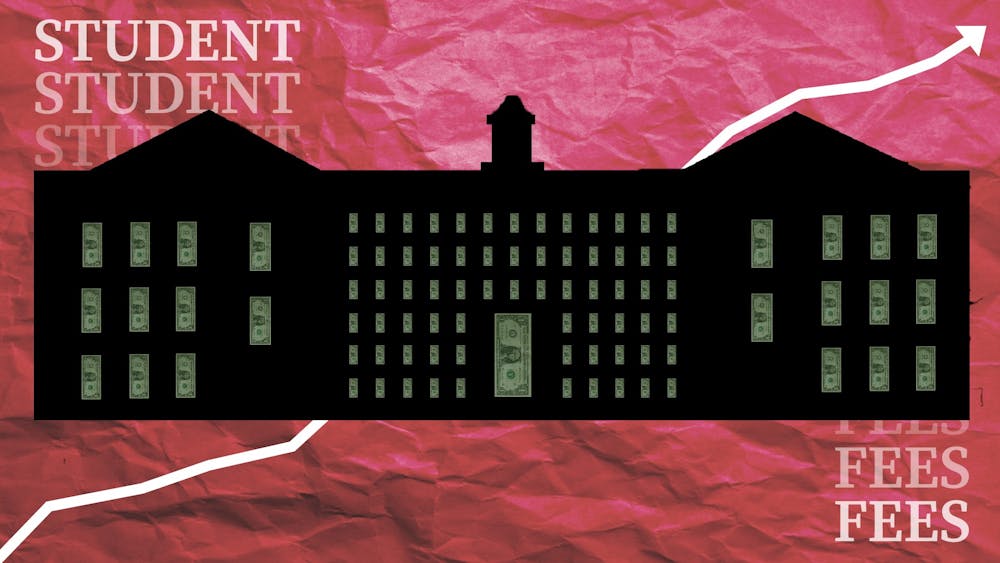Education is expensive. On top of six-figure tuition bills, every IU student must also pay an onslaught of mandatory fees. But as the cost of higher education steadily grows, the brunt of fee payments hit our most impoverished students the hardest.
There is little to no student input when IU decides whether to raise the already more than $1,400 annual mandatory fees — except for the Committee for Fee Review.
The CFR is an obscure and largely anonymous university mechanism. It oversees the allocation of the $601.66 annual student activity, health and transportation fees. Tucked away in the Division of Student Affairs, seven students help determine how to distribute these fees fairly.
Or at least it’s supposed to be fair.
Related: [OPINION: Freeze the fees: How IU’s student fees nickel and dime us to oblivion]
Abolfazl Alipour, a fourth year graduate student pursuing a double PhD in neuroscience and psychology, was briefly a member of the CFR. His story reveals a broken institution — wholly undemocratic, secretive and stupid. As the CFR stands, it shouldn’t be anywhere near our $600.
Alipour said he applied to join because he wanted to represent the concerns of graduate student workers and better understand IU’s process to determine mandatory fees.
He left when the co-chairs of the committee, IU Student Government President Rachel Aranyi and Graduate and Professional Student Government President Dakota Coates, insisted members sign a confidentiality agreement. To continue as a member Alipour would have been required to sign the agreement but refused, he said.
Related: [Graduate student says he was forced to choose between IU advisory committee, workers coalition]
Aranyi and Coates justified the agreement by saying IU already expects confidentiality from the CFR, information shouldn’t be released before it’s finalized and committee members shouldn’t fear criticism from their peers for what they decide.
While the committee can’t increase or decrease the total amount students are charged, the CFR meets every two years to hear requests for funding and determine how the student activities fee should be allocated. Organizations and services such as Recreational Sports, IUSG, GPSG, Student Legal Services, the Black Student Union and others rely on funding secured through the process.
Aranyi and Coates, not voting members themselves, chair all meetings, approve release of all materials prepared by the CFR and select which students serve on the committee. They also have the power to require a confidentiality agreement.
“To be very clear, this is a student-run committee and IU does not and will not make such decisions,” IU spokesperson Chuck Carney said in an email. “In fact, we very much advised against the agreement for the sake of transparency.”
Our student body presidents didn’t listen. When asked if the university cautioned against the agreement, Aranyi and Coates answered indirectly.
“We did not write the NDA,” they said in an email. “It was written by University officials.”
Alipour said he thought this was undemocratic and the process should be as transparent as possible. It’s a public university, and it’s our money.
“Students should be able to come to these meetings and just sit and see what’s going on,” he said.
But you would be hard pressed to find any public information about how the committee operates.
The CFR was restructured in 1997 to allow input from students on how different fees should be allocated. Its current iteration — with its selective, biased and inadequate representation — fails to provide a voice for all IU students.
The destination of more than $25 million in student fees is left to seven mostly white and male students. This is disappointing, but it’s certainly not surprising for a predominantly white university that has barely held itself accountable for its historical lack of diverse representation.
[Related: OPINION: IU needs to do more to address the racist incidents that keep happening]
The committee’s recommendations must pass through 12 university administrators for final approval, from Dean of Students Dave O’Guinn to the nine Board of Trustees members. Ten of those administrators are white.
When the application for the CFR opened in December 2020, Coates told the Indiana Daily Student his top priority was ensuring a diversified applicant pool. With five white members and five male members, it’s clear he failed to deliver. Aranyi and Coates did not respond to questions about the CFR’s diversity.
Coates also said he wanted a diversity of academic programs represented. The committee now only includes one graduate student.
Alipour said he hoped to serve as a representative of the student group he identified with — graduate student workers. His selection to the CFR occurred just as the Indiana Graduate Workers Coalition launched its historic fee strike in January.
[Related: Indiana Graduate Workers Coalition calls for boycott of IU’s mandatory fees]
The graduate students participating in the fee strike will withhold all mandatory fees for the spring semester.
“We’re doing the fee strike because we don’t feel those in charge of these fees are listening to us,” coalition member Chelsea Brinda said. “We need someone to recognize that we’re suffering under the weight of these fees.”
Dozens of IU faculty signed a letter of support released Feb. 9, and graduate students at the University of Chicago and SUNY Albany are withholding their own fees in solidarity.
The CFR’s actions don't have to contradict the goals of the coalition. The committee could be a powerful tool for student input, but instead it’s stymied by a weak structure and a multitude of bad actors.
A better system can be established.
First, the CFR must be conducted through open door meetings. No confidentiality agreements, no vague selection process and no bullshit. Public scrutiny and pressure are needed to hold this committee accountable. The number of members should be increased to reflect a broader range of student leaders.
Second, the CFR’s purview should be expanded, not restricted. Right now, the CFR can only provide input on less than half of IU’s mandatory fees. Once an equitable process for the CFR is created, it should have the ability to advocate for students on a broader range of fees, by reviewing, auditing and advising on the numerous other fees we pay.
But today, the CFR serves as a largely symbolic committee. The committee diverts the influence of all IU students by granting feigned power to an exclusive group of students. Alipour’s experience demonstrates an inherent problem in its structure.
The committee’s composition shows student input is only valued when it is pigeonholed to fit the agenda of a university serving the interests of everyone but its students. If IU wants students to have legitimate positions of influence, it must begin by restructuring abysmally nebulous and inequitable committees such as the CFR.
Our fees keep increasing, and the CFR doesn’t let us do anything about it.
“It’s as if Congress wants to pass a law, and you don’t know what the law is,” Alipour said. “You can’t call your representatives and say ‘Well, I disagree with that. I don’t want this happening’ because it’s something hidden from you.”
Rebekah Amaya (she/her) is a junior studying law and public policy and critical race and ethnic studies. She wants to go into immigration reform advocacy.
Brian Hancock (he/him) is a senior studying law and public policy and international political economy. He represents the School of Public and Environmental Affairs in the IU Student Government Congress and chairs the Oversight and Reform Committee.
Kyle Linder (he/him) is a senior studying journalism and international relations. He wants everyone to join a union.






